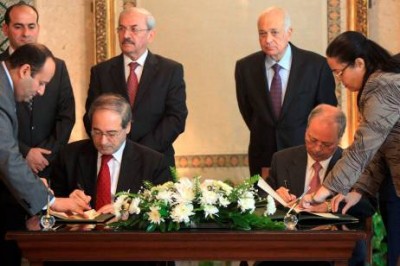
By: Patrick Martin
The government of Syrian President Bashar al-Assad signed an Arab League peace initiative this week, admitting outside observers to his country even as his Syrian forces killed as many as 200 people in two of the deadliest days since the current uprising against the regime began in March.
As for the Arab League mission, an advance group is to arrive in Syria later this week to prepare the way for a body of monitors expected at the end of the month.
But can any outside plan succeed in resolving this conflict?
Here are some of the factors to consider.
The goals
Most proposals come down to two or three fundamental objectives:
1. Stop the killing
2. Greater pluralism in government
3. Getting rid of Mr. al-Assad
Insistence on the third objective, however, could scupper progress on the first two goals.
The question is: Can the first two goals be obtained while Mr. al-Assad is still around?
The proposals
There are more than half a dozen serious proposals on offer. Every one of them has drawbacks.
The latest scheme: The Arab League initiative
The plan calls for Syria to withdraw its forces from the streets, to admit outside monitors and to commence a dialogue with the opposition.
Failure to comply is to result in sanctions against the country.
The problems:
– Monitors have a limited one-month mandate and must operate under the “protection of the Syrian government.”
– Sanctions are not likely to be implemented by neighbouring Lebanon, Iraq and Jordan, rendering the punishment meaningless.
The quote: “Assad was just granted several weeks of respite in which he can do pretty much what he wants.” – Ammar Abdulhamid, Washington-based, Syrian-born human-rights activist
The only initiative being applied: Limited sanctions
Economic measures, including blacklisting Syrian oil and other exports, have been imposed by European and other Western nations, including Canada, to try to bring Syria to heel.
The problems:
– There are plenty of countries such as Russia, China and Iran willing to deal with Syria.
– Damascus has lots of experience coping with measures such as these.
The elusive dream: A UN resolution
A UN Security Council resolution that calls on all parties to observe a ceasefire and requires the deployment of Arab, Western, Russian and Chinese observers could be the best way to achieve an international consensus that the regime cannot ignore, thus ensuring the protection of civilians on the ground.
The problem:Russia and China will not support a resolution with real teeth.
The quote:“Can the U.S. and EU get the Chinese and Russians to endorse such [a proposal]? If not, then the protesters will not be part of the consensus.” – Ammar Abdulhamid
Pie in the sky: No-fly zones
Both the Syrian National Council and the Free Syrian Army have called for the establishment of no-fly zones and safe havens for refugees, to be policed by members of the international community.
The problem: Russia and China will veto any UN initiative, and Western powers aren’t prepared to mount a Libya-style operation.
The status quo
Under the current situation the parties have reached a stalemate. The heavy-handed response by the security forces has prevented protests in the country’s most populous areas and the determination of the protesters has not been defeated by the regime.
The problem:Continuing the way things are will not lead to dramatic change in the regime.
The quote: “The Syrian National Council, while making strides, remains fractured and lacks broad-based support within Syria.” – Marwan Maalouf and Khattar Torbey, authors of Breaking the Stalemate in Syria
The best hope: Negotiate
A U.S. group called Project on Middle East Democracy has come up with what may be the most realistic approach to the Syrian crisis. It recognizes that Mr. al-Assad is unlikely to be forced from office, and calls on the SNC to broaden its membership and to enter negotiations with the regime, leading to elections next year. It depends on an end to hostilities against Syrian citizens and on a new constitution being drafted by a committee that includes members of the SNC.
The model would be something akin to the Saudi deal to ease Yemen’s President Ali Abdullah Saleh from office, or the case of former Serbian president Slobodan Milosevic’s slow departure. It would include the release of political prisoners, safe return of opposition exiles and protections for free and open press, including international media.
The problems:
– The SNC leadership, comprised heavily of Islamists and exile figures, is disconnected from activists on the ground and unrepresentative of Syria’s diverse sectarian makeup.
– The SNC has refused to consider negotiations with Mr. al-Assad.
The quote: “If Assad proves unwilling to conduct good-faith negotiations on political reform and potential transition, his intransigence will bolster the popularity of the opposition among the critical silent majority, which could then push the Alawite-dominated security forces to abandon President al-Assad in order to secure their own survival.” – Marwan Maalouf and Khattar Torbey, authors of Breaking the Stalemate in Syria
The wild card
Iraqi Foreign Minister Hoshyar Zebari may be in the best position to help carry out the kind of negotiations envisioned by the POMED report. Mr. Zebari, a member of the Iraqi Kurdish community, has announced he is undertaking this week an initiative to mediate between the opposition and the regime. The effort is likely to have greater success with the al-Assad regime, coming from a country that abstained from the Arab League sanctions proposal and has remained neutral throughout the Syrian conflict.

Leave a Reply
You must be logged in to post a comment.